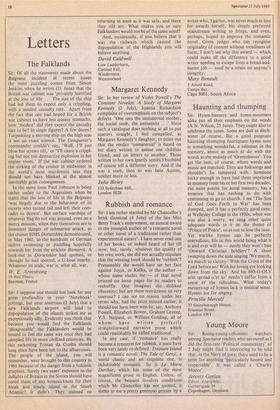Letters
The Falklands
Sir: Of all the statements made about the Belgrano incident in recent issues the most puzzling conies from Simon Jenkins when he writes (11 June) that the British war cabinet was 'privately horrified at the loss of life ... The size of the ship had led them to expect only a crippling, with a modest casualty rate.' Apart from the fact that one had hoped for a British war cabinet to have less queasy stomachs, how 'modest' did they expect the casualty rate to be? In single figures? A few dozen? Torpedoing a moving ship on the high seas is not an exact science. The Conqueror's commander couldn't say, 'Well, just blow her screws off,' or 'I'll cause a crippl- ing but not too destructive explosion in her engine room.' If the war cabinet ordered the sinking of the cruiser in midwinter in the world's most murderous seas they should not have blinked at the almost inevitably grim consequences.
In the same issue Paul Johnson is being rather unfair to the Argentines when he states that the loss of life in the Belgrano `was largely due to the behaviour of its escorts who turned tail and left their com- rades to drown'. But surface warships of whatever flag do not stay around, even on a mercy mission, when they themselves are in imminent danger of submarine attack, as the cruiser HMS Dorsetshire demonstrated, in May 1941, to the hundreds of German sailors swimming or paddling hopefully towards her from the stricken Bismarck. A look-out in Dorsetshire had spotted, or thought he had spotted, a U-boat nearby. Whatever its scale, war is, after all, war.






































 Previous page
Previous page